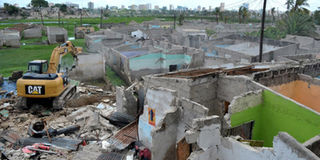Anxiety looms as Dar master plan beckons

What you need to know:
Local government authorities in various parts of the city are busy responding to inquiries from residents seeking clarifications on when the plan would be released, and what would become of their structures
Dar es Salaam. An envelope of fear and anxiety has hit owners of plots and buildings in unsurveyed parts of the city as June approaches.
Three months from now, the government is expected to set its new master plan in motion.
The document, which will lay bare various places and their uses, will likely turn the majority of land owners into evictees because only 20 per cent of city residents live in surveyed areas.
Owners of structures for various uses are panicky, not knowing what their fate will be in the less than three-month period from now. But there are ominous signs already, like the demolition of houses built in flood-prone areas. The exercise has rendered thousands of people homeless, and deeply traumatised.
Local government authorities in various parts of the city are busy responding to inquiries from residents seeking clarifications on when the master plan will be released and what would become of their structures.
A local leader for Mabibo Street, Mr Mayunga Mayunga, yesterday told The Citizen on Saturday that the issue crops up at every public meeting they convene nowadays.
“Following the information that the government will issue a new [sic] city master plan, people are asking us when it will be released, and we tell them it isn’t ready,” Mr Mayunga said.
He noted that about 80 per cent of the houses, which were built in 1980s, are on squatter land
“If the master plan leads to the demolition of houses, many people in my area will be affected,” he said. He was not in position to specify how many houses would be affected.
However, he welcomed the move to distribute the document to local government leaders, as it would help them to know which areas had been set aside for which uses, and thus simplify their work.
Some landlords have also had sleepless nights, fearing that someday, they would be jolted by eviction notices pasted on the main doors of their houses.
Ms Maria Mzunda, 60, a petty trader whose livelihood is derived from selling snacks, and built her house in the early 1970s, remarked: “I don’t understand what the master plan is all about. The issue worries me deeply.”
Mr Abdallah Mohammed, 88, is also a squatter at Mabibo. He built his house in 1966 on land whose use hasn’t been specified. He is keeping funfairs crossed.
“I don’t know how things will unfold, but I believe there would be discussions between us and the authorities,” he said.
The deputy minister for Lands, Housing and Human Settlements Development, Ms Angeline Mabula, told The Citizen on Saturday that the city master plan is still in the preparatory phase, one of whose highlights include input of views from stakeholders. Thereafter, she explained, wananchi would give their opinions, for consideration before the final plan is produced and becomes operational in June as scheduled.
“We are engaging stakeholders in order to avoid land disputes with citizens in future. I can’t give details on the content of the master plan since some of the issues may change in tune with consultations,” she said.
But one of the officials within the ministry, who didn’t want to disclose his identity, told The Citizen on Saturday that all wananchi who built residential houses and other forms of structures in areas meant to host public schools, hospitals, graveyards and open spaces for sports would be evicted. “The government is looking forward to retaining all areas, which had been allocated for graveyards, hospitals, schools and other public activities; those who put up structures there will be evicted,” he explained in an emphatic tone. However, he was not sure whether the victims would be compensated or not.
It was reported that the master plan would have a lot of changes compared to the previous one whose span stretched from 1979 to 1999.
The lifeline of a city master plan is only 20 years, so the initial city master plan expired in 1999. During the past 16 years, Dar es Salaam has been operating without a settlement plan.
Most people bought plots for residence by only involving local government authorities without being aware of the central government’s plans for specific areas.
This resulted in residential settlements and industrial centres in areas not earmarked for the purposes.




